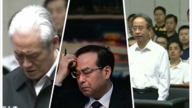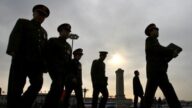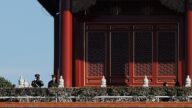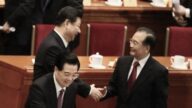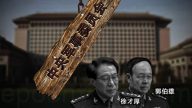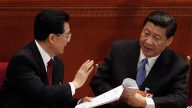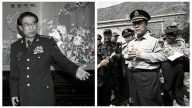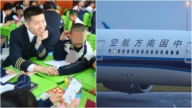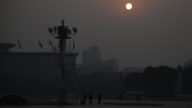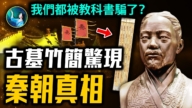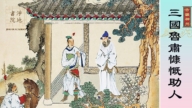【新唐人2014年07月24日讯】日前网路上广泛流传,前中共军委副主席郭伯雄化妆成女性出逃,在海关被拦截的消息。周日,大陆警方刑拘两名网民,并处罚了另外37人,声称他们涉嫌在网上编造相关谣言。
7月20号,党媒《新华网》引述公安部门消息说,7月15号,北京一名马姓网民、和海南裴姓网民,先后在《新浪微博》发布:“上海进出航班全面延误,是因为在抓某人,为了防止某人跑掉或者顽抗,就以军事演习为名,把机场给封锁了。”
报导说,公安机关已经刑事拘留了马某、裴某,并对37名网民作治安处罚和教育训诫。
不过事实上,从6月30号中共军委前副主席徐才厚落马后,网路就传开,中共已经针对和徐才厚同一级别的另一只军中“大老虎”——郭伯雄收网。
到了7月15号,网路上有关“郭伯雄女装出逃”的消息更多,还广泛流传一篇“G将军出逃记”,里面详细描述郭伯雄出逃的时间,和班机。
时事评论员黄金秋指出,所谓的“谣言”主要是因为中共政治上暗箱操作、新闻不自由造成的。
时事评论员黄金秋:“很多信息它说是谣言,但是我们发现谣言往往变成了遥遥领先的预言,从最开始王立军出逃成都美国领事馆,到后来薄熙来的事情,包括他老婆杀害英国人的事情,包括后来周永康政变的事情,现在都是一步一步的被证实。”
原《河北人民广播电台》编辑朱欣欣则表示,近一段时间以来,各种诡异的政治谣言满天飞,但基本上是中共高层在内斗中,互相“放风”,用来打击对方的。
原河北人民广播电台编辑朱欣欣:“习近平反腐以来,也引起了内部贪官的恐慌,所以各种复杂的情况也都是层出不穷。这样有意无意的,就可以从内部传播出来种种的信息,可是这种信息传播出来经过了很多人的口,辗转以后肯定会有失真或者是走样的现象。”
除了郭伯雄出逃的消息外,近期还有“曾庆红被调查”,“宋祖英被抓捕”,“贾庆林在内蒙被控制”,以及众多贪腐官员遭抓捕等等消息,在网络流传。
朱欣欣分析,目前中共再次借“传谣”抓捕网民,主要是对民间传播中共内部权斗行为的恼火。
朱欣欣:“中共内部的,还有中共外部的,社会的矛盾越来越尖锐,冲突越来越尖锐,各种情况又得不到真正的报导,借着民意的渠道就扩散开来,这是谣言的一个重要的原因,它打压这个‘谣言’也是为了对民众进行恐吓,达到震慑民意的作用。”
郭伯雄出逃的消息传出后,中共“互联网信息办公室”在7月17号晚间,通过《新华网》发消息,声称对31家所谓“谣言”比较集中的网站,给予关闭整改处罚。
事实上,今年以来,当局已经对网络言论进行了一系列的严格控制,不仅在2月正式成立了“网路安全和信息化领导小组”,由中共党魁习近平亲任网路安全组组长。还在5月,由“互联网信息办公室”联合工信部、公安部,在全国范围内,开展了一个月的所谓“即时通信工具专项治理行动”。当时,通信企业也宣称,要建立专门的“辟谣队伍。”
黄金秋:“在中国,缺乏一个自由的民主监督,缺乏舆论自由的环境下,所谓的谣言是不是谣言?在网民心中肯定是一杆秤的,换句话说,有些东西你不去澄清、去公开,那些网民他们就会从不同的渠道得到一些其他的信息,然后互相印证,变成了一种间接的舆论监督。”
2013年的中国,被舆论称作“言论管控最严厉”的一年。从中国门户网站到报纸杂志,从传统通信平台到新兴社交平台,从大V、名人到公知、记者,都遭到中共不同程度的打压。
据中共今年1月份的数据显示,中共在去年所谓的“净网”专项行动中,查处了1万多家所谓的违规网站,抓捕了1万1千多人。
采访编辑/李韵 后制/李勇
39 Netizens Arrested for Rumors of Runaway Chinese General
Rumors have been spreading online that Guo Boxiong,
former vice chairman of China’s Central Military Commission,
has recently disguised himself as a woman
and attempted to flee China, only to be intercepted at customs.
On Sunday, mainland Chinese police had placed two netizens
under criminal detention and penalized 37 others
on charges of allegedly fabricating online rumors.
On July 20, Communist Party mouthpiece Xinhua quoted
the police department as saying that a netizen surnamed Ma
in Beijing and a netizen surnamed Pei in Hainan both made
similar posts on Weibo, a Chinese website similar to Twitter.
They said that all incoming and outgoing flights in
Shanghai were delayed because they were catching someone,
and in order to prevent that person from fleeing or resisting,
they locked down the airport in the name of military exercises.
The Xinhua report says that the public security department
had placed both Ma and Pei under criminal detention,
and issued penalties and admonishment to 37 other netizens.
In fact, since Xu Caihou, another former Vice Chairman
of the Central Military Commission, was sacked on June 30,
online rumors were already claiming that the regime
had caught another ‘big tiger’ with Xu’s rank in the military:
Guo Boxiong.
By July 15 there were more online rumors about Guo
disguising himself as a woman and fleeing the country.
A story called, “The Great escape of General G" was widely
spread on the internet, detailing Guo’s escape,
including the time and the flight number.
Commentator Huang Jinqiu says that the so-called ‘rumors’
are the results of CCP’s opaque political operations
and lack of press freedom.
Huang Jinqiu: “A lot of information was labeled as rumors,
but many of them often turned out to be accurate predictions.
From the incident of Wang Lijun fleeing to the U.S. embassy
in Chengdu, to the incident of Bo Xilai, including the murder
of Neil Heywood by Bo’s wife, to Zhou Yongkang’s coup plot,
step by step, all of these were later proven to true."
Zhu Xinxin, the former editor of Hebei People’s Radio says
that a variety of strange political rumors have been circulating
in recent times, but many of them were leaked by top level
CCP officials amid their infighting.
Zhu Xinxin: “Xi Jinping’s anti-corruption campaign
has caused the internal corrupt officials to panic,
hence there were so many complicated situations.
This has caused a lot of intentional or unintentional
information leaks from insiders.
This kind of verbal information could be distorted.
Other widely spread online rumors are that former politburo
member Zeng Qinghong is being investigated,
singer Song Zuying was arrested, Jia Qingling is jailed in Inner
Mongolia, and many other corrupt officials are being arrested.
Zhu Xinxin says that the main reason the CCP is arresting
netizens again in the name of suppressing rumors
is to unleash its anger towards the news of its internal
power struggles being spread widely among the people.
Zhu Xinxin: “The conflicts within the CCP
and in the society are becoming increasingly acute.
But none of this is being truthfully reported on.
[The information] gets passed on through word of mouth
and thus rumors are formed.
The purpose of ‘suppressing rumors’ is to intimidate people,
in order to deter public opinion."
Since the news of Guo Boxiong’s escape was released,
the CCP’s Internet Information Office announced via Xinhua
that 31 websites with relatively more so-called ‘rumors’
would face being shut down and rectified.
In fact, authorities have enforced a series of strict controls on
online speech since this year.
The “Internet Security and Information Technology Leading
Group" was formed in February led by president Xi Jinping.
In May, the Internet Information Office,
the Ministry of Industry and the Public Security Department
jointly carried out a so-called “Special Rectification Campaign
on Instant Communication Tools" nationwide for a month.
At that time, communications companies also claimed
to establish “special teams" of individuals to refute rumors.
Huang Jinqiu: “There is lack of free and democratic
supervision or freedom of public opinion in China.
Are the so-called rumors really rumors?
Netizens definitely have their own judgment and standards.
If the government won’t clarify or disclose something,
then netizens will get the information from other sources,
then confirm with each other, and this becomes a kind of
indirect supervision by public opinion."
Many people say the year 2013 saw the most severe control
of speech in China.
From China’s web portals to newspapers and magazines,
from traditional communication platforms to emerging social
media platforms, from popular bloggers to celebrities
and reporters, all of them experienced the CCP’s suppression.
According to CCP’s data from January,
during the so-called “Clean the Internet" campaign last year,
more than 10,000 so-called illegal websites were investigated
and more than 11,000 people were arrested.
Interview & Edit/LiYun Post-Production/LiYong


